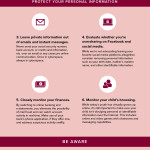
The recent compromise of four-million federal government employees’ information serves as an important reminder of this imposing threat. While the extent of the breach is still being determined by federal investigators, it appears the hack impacted employees of the executive branch but not the legislative or judicial branches, nor uniformed United States military personnel.
With thousands of Department of Defense personnel and federal contractors right here in the Tennessee Valley, security and privacy remains paramount in online activities. While there’s no way to eliminate the threat completely, we wanted to share some of the ways we’re protecting our information at Martinson & Beason, P.C., and we want to advise our clients to do the same.
-
Click to view full infographic. Use strong passwords and change them regularly. Make it difficult for hackers to gain access to your accounts. Utilize upper and lowercase letters, numbers and symbols. Use different passwords for different accounts. Additionally, question whether you really need to access sensitive information from a public wifi portal.
- Leave private information out of emails and instant messages. Never send your social security number, bank account, or credit card information, etc. over an email or any unsecure online communication. Once in cyberspace, always in cyberspace.
- Evaluate whether you’re oversharing on Facebook and social media. While we’re not advocating leaving your favorite social media platforms altogether, consider removing personal information such as your birth date, mother’s maiden name, and other identifiable information. As another consideration, think twice before notifying the online world that you’re leaving town for two weeks for that summer vacation.
- Only shop from secure online stores. When ordering online, check out the store’s security credentials. Look for a tiny padlock icon or other indication that your transaction information is safe and secure.
- Watch out for phishing scams and the “stranded traveller” scam. Beware of emails that appear to come from friends or family asking for money to help them get home or get out of bind. As soon you think you may have fallen victim to a phishing scam, notify your bank and other appropriate law enforcement agencies such as the Alabama Attorney General’s Consumer Protection Hotline at 1-800-392-5658, The Better Business Bureau at (256) 533-1640, or check out the Internet Crime Complaint Center at www.ic3.gov.
- Monitor your child’s browsing. While today’s youth has virtually grown up online, it’s still important to make sure your child isn’t divulging personal or identifiable information over the Internet. This includes online and video games with chatrooms and messaging capabilities.
- Closely monitor your finances. By switching to online banking and e-statements, you eliminate the possibility of mail fraud and can watch account activity in real-time. Make use of your bank’s phone application, if they offer one, and address suspicious activity swiftly.
- Use a phone password. If you’re not already doing so, setting up a password on your phone is one of the quickest and easiest changes you can make. As with any password, change your phone lock regularly.
Although no 100 percent guarantee exists against hackers, you can greatly reduce your risk by following these steps. Remember: if you do suspect your account or information has been compromised, contact the authorities immediately. We also recommend that you regularly check your credit report. If you have any further cybersecurity questions or concerns, call Martinson & Beason, P.C. to speak with one of our attorneys.
For more information on how to check your credit report, please see the page below:
